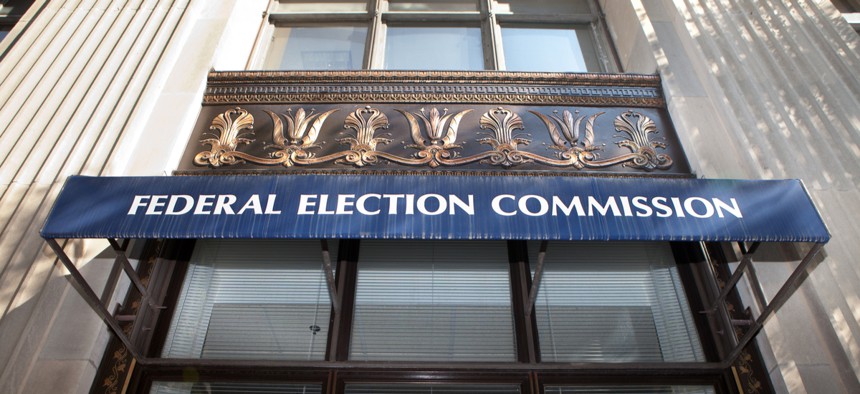Commissioner’s Resignation Renders FEC Toothless as 2020 Elections Heat Up

Mark Van Scyoc/Shutterstock.com
Without a quorum, the oversight body can’t carry out its key duties.
The federal agency responsible for enforcing the nation’s campaign finance laws has essentially lost the ability to do its job going into the 2020 cycle.
Vice Chairman Matthew S. Petersen announced on Monday he is resigning from the Federal Election Commission, an independent, bipartisan regulatory agency, leaving the FEC with just three members—not enough for a quorum.
The FEC, which is supposed to have a six-member board, needs four members for its proceedings to be valid. Lack of a quorum prevents the FEC from holding meetings, starting audits, creating news rules and imposing fines on those who violate campaign finance laws. “Without a board they basically can’t do their job,” said Elizabeth Hempowicz, director of public policy at the Project on Government Oversight.
If we don’t know “where money is coming from, making sure that presidential candidates are funded in a way that’s consistent with the law, we’ve got potentially serious problems,” said Hempowicz. “It's an election security matter and I think that’s something that should be on the front of everybody’s mind going into 2020 given what happened in 2016.”
Petersen, who joined the FEC in 2008, did not give a reason for his departure. In his resignation letter he outlined how he “consistently opposed unnecessarily rigid regulatory rulings” and “worked to shape the post-Citizens United legal framework,” following the Supreme Court’s decision in 2010 that political spending is protected speech.
The three remaining commissioners' terms have expired, but they may remain until new members are appointed. FEC Chair Ellen Weintraub, a Democrat, wrote, “The United States’ election cop is still on the 2020 campaign beat” and said the FEC will still be able to “shine a spotlight on the finances of the 2020 campaign.”
Commissioner Caroline Hunter, a Republican, issued a statement saying that despite the FEC’s inability to “hold meetings, initiate audits, vote on enforcement matters, issue advisory opinions, or engage in rulemakings” without a quorum, the commission would continue ongoing audits, litigating cases, and processing complaints, among other things. The third commissioner, Steven Walther, is an independent.
The commission has long had a reputation for partisan dysfunction (former vice chairman Ann Ravel, a Democrat, claimed in a Times op-ed in 2014 that her Republican colleagues turned a blind eye to campaign finance violations) and progressive groups have attacked it for failing to enforce the foreign money ban in 2016, among other things. In addition to not having a full slate of commissioners since February 2017, the FEC went 28 months without an inspector general before Christopher Skinner assumed the role on August 5. Among other unfilled positions, the deputy inspector general position is vacant and the general counsel is serving in an acting capacity.
“The FEC has continually failed to uphold our campaign finance laws to ensure that extreme wealth does not corrupt our political system,” Karen Hobert Flynn, president of Common Cause, a nonprofit watchdog devoted to fair democracy, wrote to Trump, encouraging him to appoint new commissioners as soon as possible. “It can only get worse if we lose any and all campaign finance law enforcement.”
Hempowicz also urged the administration to act quickly, especially because there are still ongoing investigations into the 2016 elections.
In September 2017, Trump appointed Trey Trainor, a Republican attorney from Texas, to the FEC after nominating Petersen for a federal judgeship. But Petersen wound up withdrawing his nomination and returning the FEC after a video of him struggling answer legal questions at his confirmation hearing went viral. Trump re-nominated Trainor twice, but the Senate has not taken up the nomination. The Center for Public Integrity noted that the Senate “has long observed a tradition in which the president nominates FEC commissioners in pairs—one Republican, one Democrat.” No more than three commissioners can be from the same party.
The last time the commission failed to have a quorum was in 2008. In anticipation of losing a quorum in December 2007, the commission amended its rules on what it can do without a quorum. The directive allows the commission to conduct certain administrative matters, such as approve some general public information, appoint certain acting staff members, and take actions required by inspectors general or federal statutes.
Since this was during an election cycle, the commissioners "were attempting to provide general feedback, particularly given the ongoing 2008 election cycle,” the Congressional Research Service found. “That practice generated some controversy, however, as some practitioners contended that remaining commissioners did not have the authority to meet and provide guidance.”






